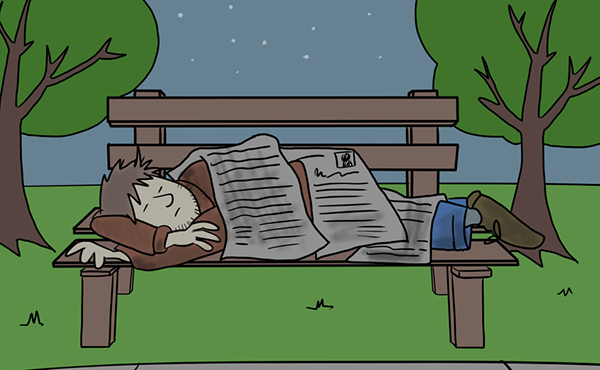
Victoria is facing a homelessness crisis. However, instead of empathy and solutions, the city’s most vulnerable have been levelled with accusations that they are lazy, dangerous drug addicts who can’t find employment and pose a threat to Victoria’s parks and residents. The first step towards deconstructing this crisis is to change the existing narrative and to work on providing what members of the street community really want: safe housing.
Prior to the pandemic, Victoria’s street community already lacked essential services and shelter spaces. Victoria’s vacancy rate has hovered around one per cent since 2016, and rentals aren’t cheap. According to WorkBC, a couple making $50-70k per year and living in a 900 square foot apartment in Victoria would only have a few thousand dollars at the end of the year in savings. Even those with regular income are faced with the difficult task of securing and maintaining housing in an economy that often puts most rentals out of reach for minimum wage earners.
A 2020 Point in Time count estimated in March that there were 1 523 unhoused people in the Capital Regional District. Many of those counted cited lack of income as the reason for being unhoused.
These 530 people represent just a small section of Victoria’s unhoused population. Some experts even say that the 1 523 people counted in the Point in Time survey may be a gross underestimate. With evictions back on the table and an uncertain economy, the amount of people on the streets will only increase. It is clear that Victoria — and the rest of Canada — has a homeless crisis that has no end in sight.
This summer, the discourse around Victoria’s street community from those that can afford the high cost of living in Victoria has revealed a severe lack of empathy for the street community. While Dr. Bonnie Henry advised us to “be kind,” the broader Victoria community clutched their pearls tighter and shunned the most vulnerable people in our city.
As shelters closed and authorities struggled to implement shelter-in-place measures introduced due to COVID-19 in March 2020, many of those counted ended up in the site set up at Topaz Park or along Pandora Avenue. Others set up tents at Beacon Hill Park, looking for a community and peer-to-peer support systems.
Between May 20-24, around 340 people living at Topaz and Pandora were moved indoors, either into the Save on Foods Memorial Centre, the Comfort Inn, or one of the other hotels bought or requisitioned by the City of Victoria and the provincial government. 90 people from these sites remained without adequate shelter and were forced to move elsewhere including into Centennial Square. Around 100 people now reside in Beacon Hill Park and have been moved about by authorities to protect environmentally sensitive areas.
Despite the challenging circumstances faced by many in the street community, media coverage of Victoria’s homelessness crisis does not consistently include the voices of unhoused people. This gap in coverage neglects the perspectives of those at the heart of the crisis and may create a lack of public awareness of and empathy towards the experiences of homeless people.
Beyond the inconsistent inclusion of unhoused voices in the media, a similar lack of consideration for the experiences of homeless people seems to dominate popular debate as well.
Tensions have been high between the street community and other Victoria residents in past months. Members of the broader Victoria community have raised concerns over the use of Beacon Hill Park by unhoused people, saying they have been followed, harassed, and threatened. At the time of writing, over 26 000 people have signed a petition urging the city to effectively ban homeless people from the park.
There are many reasons why Victoria residents may not want people living in the city’s parks. However, the people living there often don’t want to be there either, and this seems to get lost in a debate that smears the street community as lazy and criminal.
Regardless of whether or not someone has committed a crime, we should treat them with human respect, empathy, and dignity — and that shouldn’t be a radical concept. Focusing on crime, as many citizens and news reports continue to do, stokes insecurity, anger, and fear. It does not lead us towards common ground, solutions, and empathy.
When the conversation gets heated and rife with us versus them rhetoric, we risk losing sight of the bigger picture: this is about providing housing to those who don’t have it. This is about access to basic supports that many of us take for granted. Most importantly, this is about other people — people who are often facing very difficult circumstances.
By marginalizing the voices of the people involved, neglecting their concerns, or portraying them as lazy or dangerous, we fail to extend basic human empathy to people with next to nothing. Pragmatically, this lack of empathy also makes it harder to find solutions to the issue by heightening tensions and obscuring what really matters.







